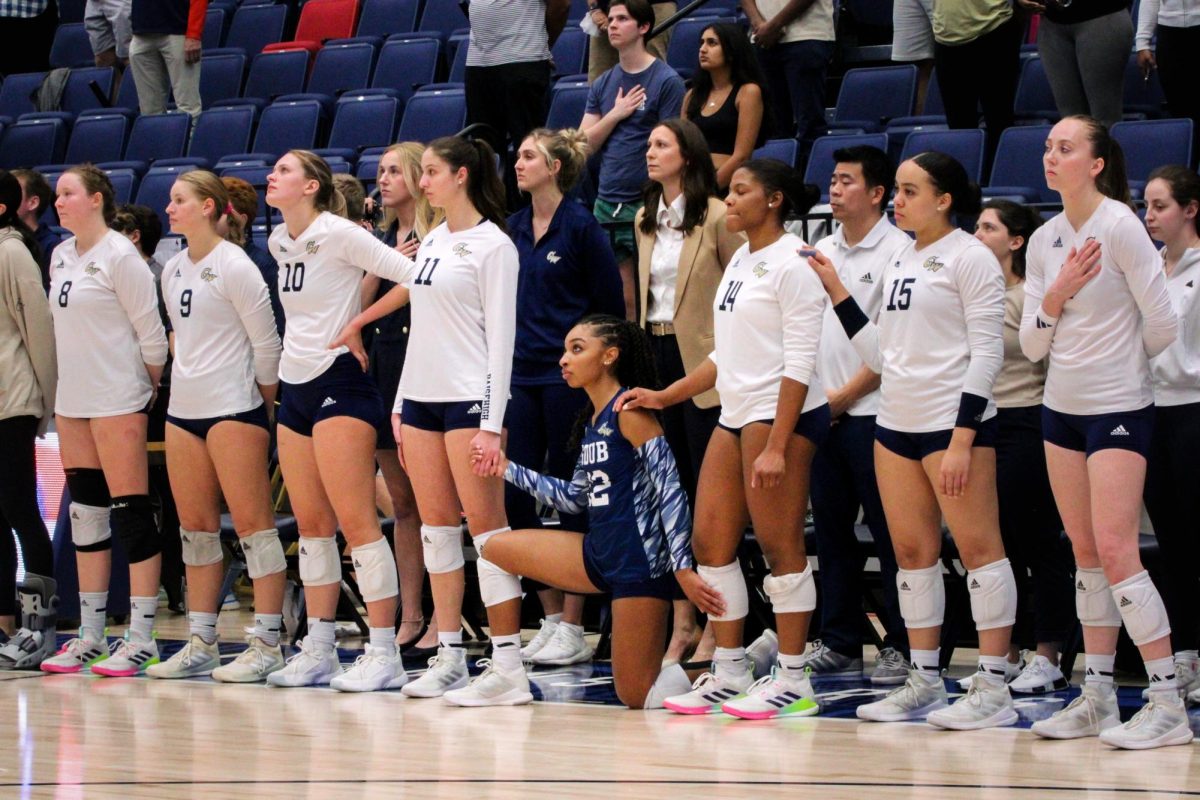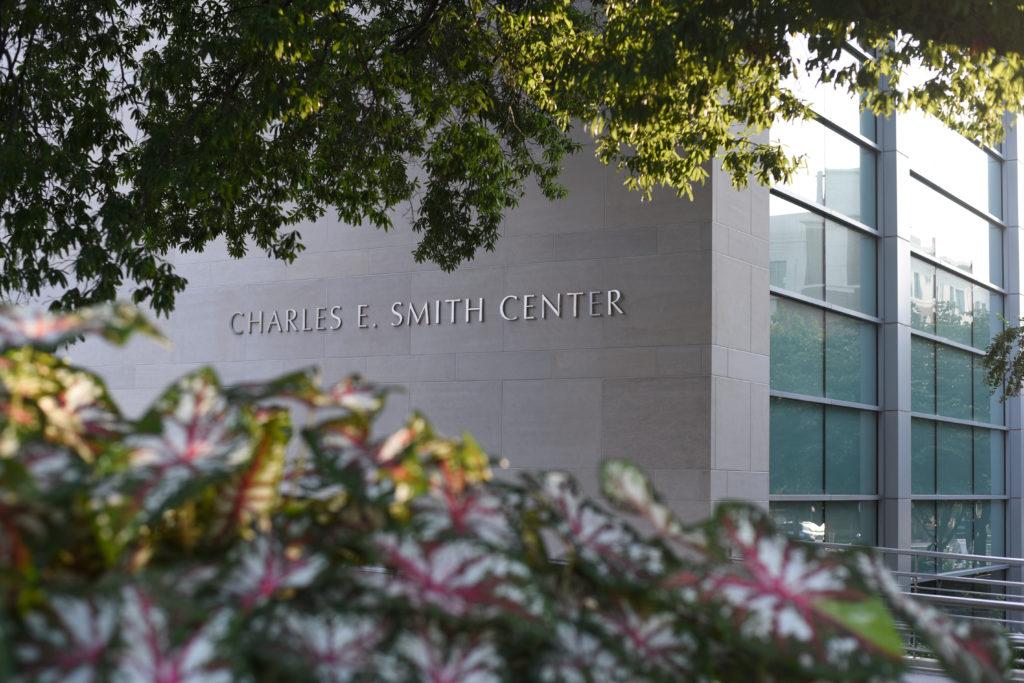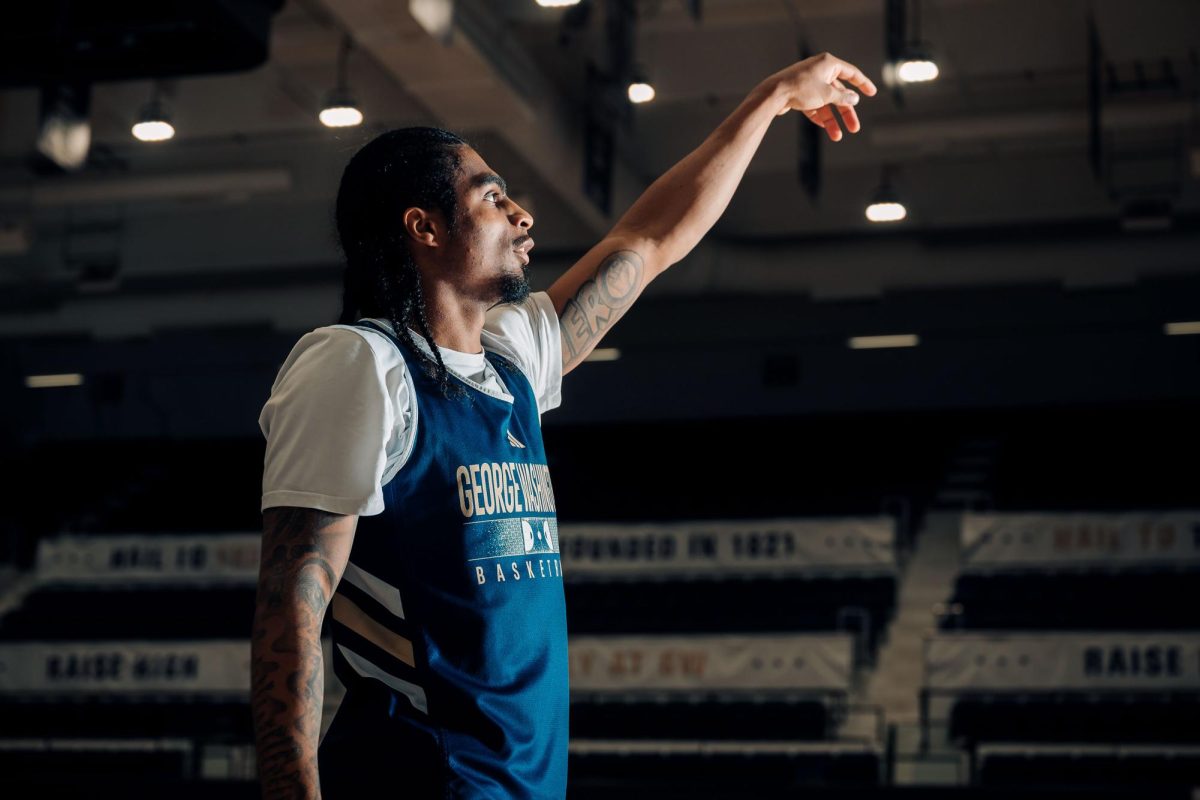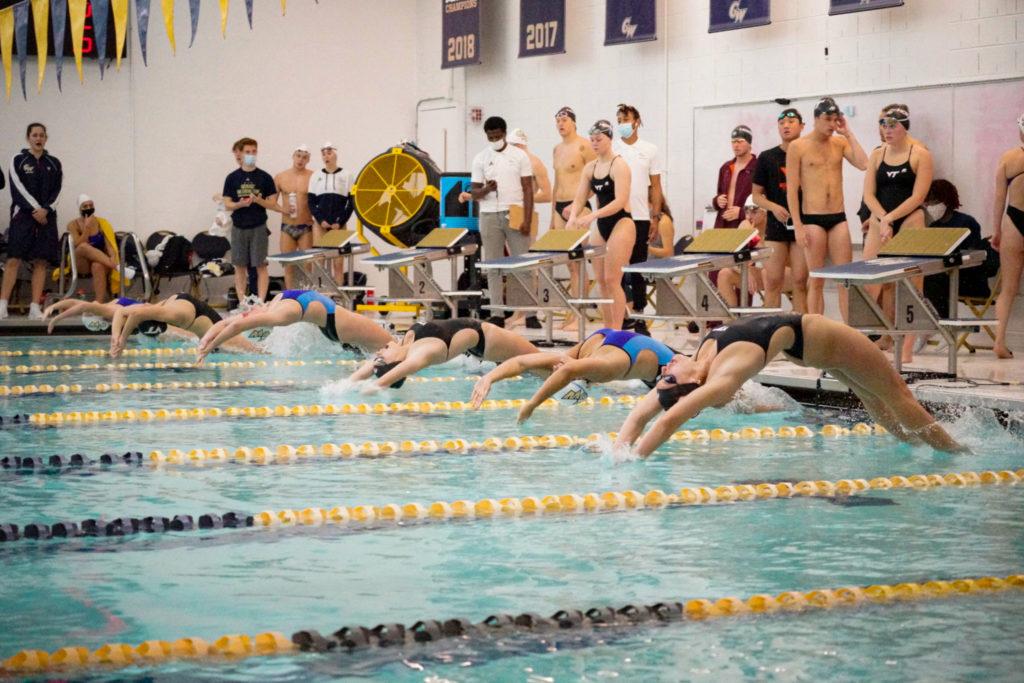At American sports games, it’s a fixture.
The PA announcer’s request to rise and remove hats, the shuffling and murmuring as the crowd collectively complies, facing the nearest flag, hands over hearts as the national anthem crackles over the speaker system.
GW volleyball games are no exception. But on the Revolutionaries’ sideline, while the rest of the gym shuffles, murmurs, turns and settles as the national anthem plays, two players take a stand by kneeling.
Holding hands with their standing teammates, sophomore middle blocker Sydney Stewart and sophomore libero Amina Robinson have knelt during the national anthem since they began playing at GW as freshmen.
While kneeling as a form of protest has become a less common occurrence since Colin Kaepernick began kneeling during the anthem at NFL games in 2016 to demonstrate against racial injustice and police brutality against Black Americans, Robinson and Stewart said they kneel to keep issues they care about — like police brutality against people of color, immigration laws and women’s rights — ingrained in the American zeitgeist.
“These issues haven’t been resolved,” Stewart said. “And people are only aware of it when it’s on social media, when it’s put in front of their face, when it’s on their Instagram feed. And I want people to be aware of it at any moment, at a volleyball game when they’re coming to watch their kids. I want people to see it.”
Stewart said her inclination toward activism began as a teenager, when a police officer shot and killed 16-year-old Ma’Khia Bryant — a girl her age — in Columbus, Ohio, in April 2021.
“That’s really when I knew that I needed to be more involved in social issues and making myself heard and known as a Black woman,” Stewart said. “Because a lot of the time, we have to scream to be heard.”
For Robinson, kneeling serves as a means for her to advocate and raise awareness for social issues she feels passionately about.
“I think it is also hard to stand for a country who you’ve repeatedly seen oppress people that look like you,” Robinson said. “And some of the social issues going on with this country, I don’t agree with and I think are morally wrong. And so for those reasons, I kneel to make a statement against, not supporting, the things that this country is putting people through.”
Robinson said her decision to kneel is further influenced by concern for the safety of her brothers and father due to disproportionately high rates of police brutality against Black men.
“Because every day, having two younger brothers, having a dad, having all these Black men I’m associated with and care about, having to think about and pray every day that they go outside and they’re not racially profiled, and someone decides that they’re looking suspicious one day and wants to do something about it because they feel threatened by their presence,” Robinson said. “Those are things that I have to think about and hope that don’t happen.”
Both Robinson and Stewart said while kneeling initially felt daunting, the support of their teammates and coach made them feel more comfortable, especially at the Smith Center. Robinson said her experience kneeling last season played a “big part” in building the confidence she now wields.
“Last season had a big part in building that confidence and bravery,” Robinson said. “We had incredible leaders to look to to help us foster that confidence.”
One of those leaders, Tierra Porter, was a former teammate and is a current graduate assistant for Athletics Educational Support Services, and she also knelt during her time with the team. The pair said seeing Porter kneel helped them gain the confidence to kneel themselves.
“I also looked up to Tierra a lot,” Robinson said. “And so her kneeling also motivated me to kneel.”
Stewart also expressed admiration for Porter, attributing the confidence she gained as a freshman to Porter’s presence and leadership.
“I mostly kneeled when Tierra was kneeling because as a freshman, I was a little bit more nervous to take a stand, especially on my own without the guidance of somebody who was older and had been experienced in this situation,” Stewart said. “So I think the only times when I didn’t kneel was when Tierra or Amina didn’t kneel.”
This season, the duo said they have leaned on their coach, teammates and each other for support, especially in environments where they haven’t felt as comfortable and safe as they do in the Smith Center.
“There’s definitely been fearful moments,” Robinson said. “But I think last year I would have let the fearfulness keep me from choosing to kneel, and I think this year and last year, going through it, just having people on your team that support you and having a coach that is 100 percent behind you, it overlays that fearfulness and helps you be comfortable enough to do it in uncomfortable spaces.”
Head Coach Katie Reifert said she supports her players’ decision to kneel and that she is “incredibly proud” of them for standing up for what they believe in.
“It’s something that, you know, to put yourself on that stage to be judged, is incredibly brave,” Reifert said. “And the fact that that’s something that they thought about very deeply and decided to do together, inspired by their teammates, which I think is also beautiful.”
Reifert said she chose to coach at GW in part because of the socially active environment where community members don’t shy away from difficult conversations.
“I love being on a college campus, especially one like GW where we’re asked to push the envelope, we’re asked to have uncomfortable conversations, we’re asked to shine a light on injustices,” Reifert said. “And I think that surrounding myself with players who feel like it’s their responsibility to do that as well, it’s really cool. And I feel really lucky to be at a place where I also feel like I have the support of my administration to support them.”
While Stewart and Robinson recognize there are “many different perspectives” on kneeling during the anthem as a form of protest, both emphasized they mean no disrespect toward veterans and the military by kneeling.
“In the media, a lot of the time, people like to paint kneeling as disrespectful to the American flag, as disrespectful to people who have served for our country,” Stewart said. “So I wanted to highlight that just to make people aware that it’s not any of that, because I very much respect the people that have served for my country. My grandfather served for our country.”
Robinson shared Stewart’s sentiment and added that she feels there’s a fundamental lack of understanding between people who choose to kneel and their critics.
“There needs to be an understanding between people who don’t understand why you do it and then people who are actually doing it,” Robinson said. “I fully respect people who are committed to committing their lives to fighting for this country. A lot of my friends’ parents are in the military or have fought for them. So when I kneel, it’s not a disrespect to them.”
Despite such misunderstandings, Robinson said kneeling is an effective tool to remind people of social issues that have gone unresolved, like police brutality.
“It can be easy to ignore or forget,” Robinson said. “These things are just happening on a loop, and until real change starts happening, it needs to be a continuous conversation that can’t be put on the back burner.”





